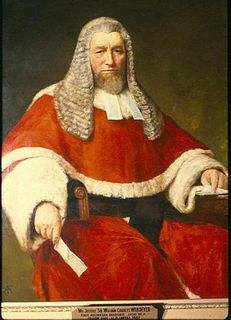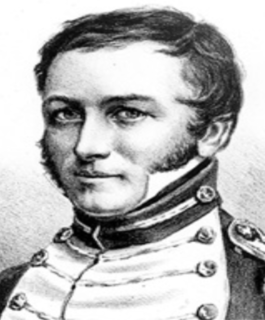Related Research Articles

Sir James Martin, QC was three times Premier of New South Wales, and Chief Justice of New South Wales from 1873 to 1886.

Waverley Council is a Local government area in the eastern suburbs of Sydney, in the state of New South Wales, Australia. First incorporated on 16 June 1859 as the Municipality of Waverley, it is one of the oldest-surviving local government areas in New South Wales. Waverley is bounded by the Tasman Sea to the east, the Municipality of Woollahra to the north, and the City of Randwick in the south and west. The administrative centre of Waverley Council is located on Bondi Road in Bondi Junction in the Council Chambers on the corner of Waverley Park.

John Hubert Plunkett was Attorney-General of New South Wales, an appointed member of the Legislative Council 1836–41, 1843–56, 1857–58 and 1861–69. He was also elected as a member of the Legislative Assembly 1856–60. He is best known for the prosecution of the colonists who brutally murdered 28 Aboriginals in the Myall Creek Massacre of 1838, seven of whom were convicted and hanged.

Sir William Charles Windeyer was an Australian politician and judge.
Richard Windeyer was a journalist, barrister and Australian politician.
University of Sydney was an electoral district of the Legislative Assembly in the Australian state of New South Wales from 1876 to 1880. It was established in the 1858 redistribution to be elected by graduates of the University of Sydney once there were 100 eligible electors.

Major Clarence Edward Martin was an Australian politician and a member of the New South Wales Legislative Assembly from 1930 until 1932 and from 1939 until his death in 1953. He was variously a member of the Australian Labor Party (NSW), the Industrial Labor Party and the Labor Party (ALP). He was the Attorney General of New South Wales from 1941 until 1953 and also held the position of Minister for Transport for six months prior to his death.
Sir John Bayley Darvall was an Australian barrister, politician and beneficiary of slavery. He was a member of the New South Wales Legislative Council between 1844 and 1856 and again between 1861 and 1863. He was also a member of the New South Wales Legislative Assembly for three periods between 1856 and 1865. He held the positions of Solicitor General and Attorney General in a number of short-lived colonial governments.

The Electoral district of County of Durham was an electorate of the New South Wales Legislative Council at a time when some of its members were elected and the balance were appointed by the Governor. It was named after Durham County, which lies on the north side of the Hunter River.

James Merriman was an Australian cooper, whaler, publican, shipowner, alderman, mayor of Sydney and member of the New South Wales Parliament.

Commander John Lamb was an English-born Australian naval officer, banker and politician. The son of Captain Edward Lamb of the East India Company and Eliza Buchanan, Lamb was appointed to the New South Wales Legislative Council on 10 September 1844. He had a distinguished career with the Royal Navy, beginning at age 11 on his uncle Captain William Buchanan's British Navy warship, the Leviathan. Lamb was noted for his role in several feats over the French and accepted the rank of retired naval commander in May 1846.

Lady Mary Elizabeth Windeyer was an Australian women's rights campaigner, particularly in relation to women's suffrage in New South Wales, a philanthropist and charity organizer.
A by-election was held for the New South Wales Legislative Assembly electorate of Upper Hunter on 15 April 1861 because of the resignation of John Robertson. Roberston had resigned as Premier on 9 January 1861 to concentrate on the passage of the Robertson Land Acts, which would open up the free selection of Crown land. The bills were passed by the Legislative Assembly on 26 March 1861, and Robertson resigned to be appointed to the Legislative Council to ensure their passage into law.
A by-election was held for the New South Wales Legislative Assembly electorate of The Hastings on 4 July 1870 as a result of the Legislative Assembly declaring the election of Horace Dean was void. Dean had been appointed the postmaster at Tinonee at the time of the nominations for the 1869 election and resigned the following day. The Committee of Elections and Qualifications held that because he had an office of profit under the crown at the time of his nomination meant he was incapable of being elected, or of sitting, or voting, as a member of the Assembly.
A by-election was held for the New South Wales Legislative Assembly electorate of University of Sydney on 5 October 1876 because of creation of the district. The Electoral Act 1858 (NSW) provided that the district would be established once there were 100 people who had graduated from the University of Sydney with a Doctor of Laws, Doctor of Medicine or Master of Arts. In June 1876 the University an additional graduate with a Doctor of Law and 10 with a Master of Arts, bringing the total to 111. Voting was restricted to members of the university senate, professors, public teachers and examiners, the principals of incorporated colleges within the university, masters of arts, doctors of laws or medicine and members of the University who were entitled to vote for the university senate.
A by-election was held for the New South Wales Legislative Assembly electorate of University of Sydney on 15 July 1879 because William Windeyer resigned to accept a temporary appointment as a judge of the Supreme Court.
West Sydney, an electoral district of the Legislative Assembly in the Australian state of New South Wales was created in 1859 and abolished in 1894.
A by-election was held for the New South Wales Legislative Assembly electorate of West Sydney on 15 December 1868 because of the resignation of Samuel Joseph, who had traveled to Europe but stayed longer than he had contemplated and so resigned his seat.
References
- 1 2 "Sir William Charles Windeyer (1834–1897)". Former Members of the Parliament of New South Wales . Retrieved 8 November 2020.
- ↑ "City of Sydney". Maritime Heritage. NSW Office of Environment & Heritage. Retrieved 8 November 2020.
- ↑ "Wreck of the City of Sydney". The Argus . 10 November 1862. p. 5. Retrieved 8 November 2020– via Trove.
- ↑ "Windeyer, Sir William Charles (1834–1897)". Australian Dictionary of Biography . Melbourne University Press. ISSN 1833-7538 . Retrieved 8 November 2020– via National Centre of Biography, Australian National University.
- ↑ Crown Lands Alienation Act of 1861 (NSW) and Crown Lands Occupation Act of 1861 (NSW)
- ↑ Grants for Public Worship Prohibition Act of 1862 (NSW)
- ↑ Windeyer, W C (23 December 1862). "To the electors of West Sydney". The Sydney Morning Herald . p. 1. Retrieved 8 November 2020– via National Library of Australia.
- ↑ "Writ of election: West Sydney". New South Wales Government Gazette (255). 24 December 1862. p. 2673. Retrieved 8 November 2020– via Trove.
- ↑ Green, Antony. "October 1863 West Sydney by-election". New South Wales Election Results 1856-2007. Parliament of New South Wales . Retrieved 8 November 2020.